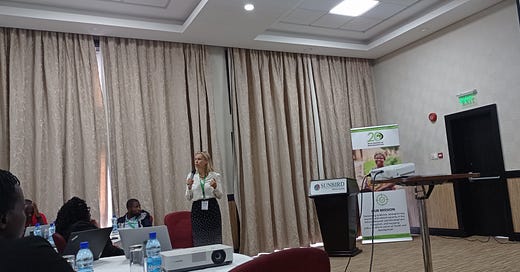Malawi's MUBAS Leads AI Applications in INSPIRE PEACH Project
AfricaBrief Interview: Dr. Amelia Taylor on Malawi's Role in the INSPIRE PEACH Project
Sumeya Issa from AfricaBrief had an interview with Dr. Amelia Taylor, a lecturer in Artificial Intelligence at the Malawi University of Business and Applied Sciences (MUBAS), to discuss Malawi's involvement in the INSPIRE PEACH Project and the country's capacity to embrace new technology solutions like AI.
Sumeya: What is Malawi's role in the Inspire Peach Project?
Dr. Taylor: MUBAS is a key partner in the PEACH project, taking the lead in the application of AI tools. MUBAS has been actively involved in data production, ETL, and training material development. Additionally, MUBAS spearheaded the approach to synthetic data generation.
Sumeya: Based on your experience working under MUBAS, how would you assess Malawi's capacity to embrace new technology solutions such as AI?
Dr. Taylor: MUBAS offers undergraduate courses in AI and provides research opportunities for postgraduate students in AI and Machine Learning. In 2019, MUBAS produced its first PhD holder in AI, Dr. Thokozani Chimkono, who worked closely with Dr. Taylor (his internal supervisor). MUBAS is also introducing an MSc programme in Data Analytics this year.
Through this project, MUBAS has also increased its research capacity and created job opportunities.
The project has funded two PhD positions at MUBAS. The area of research in the INSPIRE PEACH is complex and has been of special interest recently in Africa. OHDSI (the platform we are using) has recently opened an Africa chapter. We hope that this will enable MUBAS to increase collaboration and research output.
Sumeya: How essential are solutions of this nature for Malawi as a nation?
Dr. Taylor: The solutions we develop focus on improving the development of reliable data useful for decision-making. These are tools for data coding and standardisation, robust analytics pipelines, and also using AI to increase intelligent access to research and news generated in Malawi.
Sumeya: What were some of the major challenges faced by the project from its inception to its current level of advancement?
Dr. Taylor: Learning new AI complex tools such as those developed by OHDSI, and applying them to a new context in Malawi has been challenging. The past two years have resulted in the acquisition of skills that can now be put to further use and leveraged.
Another challenge was the time required to establish a good working relationship with the MOH/PHIM that fit into the time frame of the project. There were varied causes for this, including the perception that the MUBAS Computer Science and AI department was not known to traditionally involve itself with health data.
However, our continuing dialogue resulted in a fruitful MOU and collaboration with PHIM/MOH.
We worked together to develop processes for data cleaning and anonymization. We also run a study to gather insights into data collection processes in Lilongwe, which we are presenting at the Dissemination event.
Sumeya: How have the challenges you have faced helped to inform and improve future projects?
Dr. Taylor: We seek long-term collaborations that allow us to gain insights into the genuine needs of practitioners and stakeholders. Our existing MOU with the MOH/PHIM is a source of pride for us, and we aim to leverage it for future grants.
In addition, we aim to expand participation in the AI field to include individuals working at the point of care, industry professionals, and the startup ecosystem. At the same time, we encourage engagement with the international research community.
Sumeya: How would you describe your experience working with the MUBAS team over the past two years on the INSPIRE PEACH PROJECT?
Dr. Taylor: The experience has been positive and catalysing. We have built a good foundation and established fruitful collaborations.
Sumeya: How would you describe the youth involvement capacity of Malawi in solutions of this nature? Are young people included enough?
Dr. Taylor: The project offers job opportunities to young graduates: currently employing 4 who graduated in the last 3 years. Overall, we employed 5 full-time employees and had 3 interns. Additionally, we worked with local start-ups. Through our events, we reach out and hopefully inspire young researchers interested in AI, Data Science and ML.
We created two PhD positions at MUBAS in AI/ML/ Data Science, which are fully funded, and we seek to recruit candidates in the next 2 months.
Sumeya Issa: Thank you for your time, Dr. Taylor.
Dr. Amelia Taylor: You're welcome.



